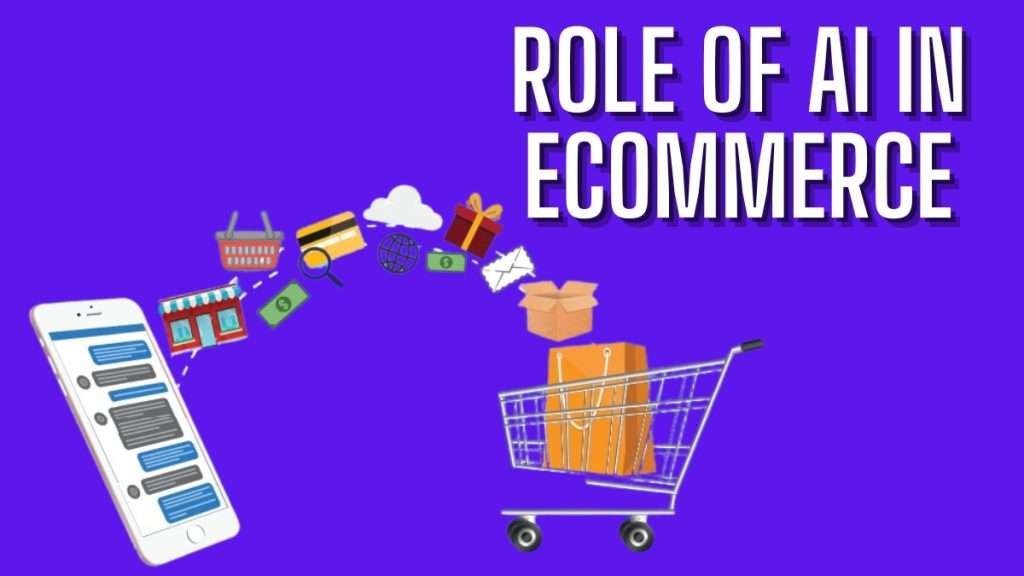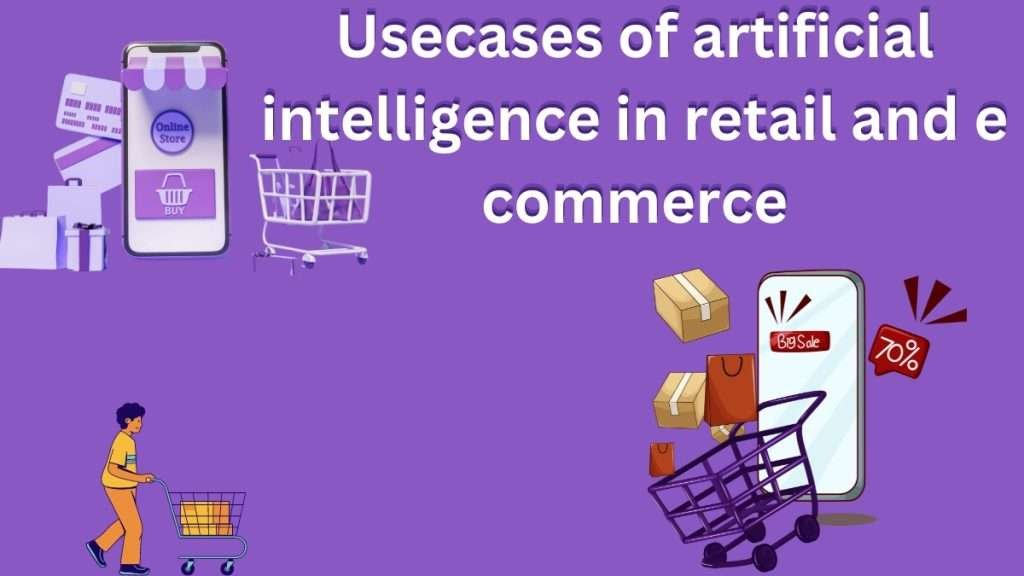Artificial Intelligence (AI) is reshaping various industries, and retail and e-commerce are no exceptions. The integration of AI into these sectors has brought a brand new paradigm, enhancing client experience, optimizing operations, and using boom. This blog delves into the differences among retail and e-commerce, the jobs AI plays in each, and gives actual-global examples of AI programs in those domains.
Difference between retail and e-commerce
Retail and e-commerce are often used interchangeably, but they constitute exceptional paradigms within the shopping for and promoting panorama.
Retail
Retail refers back to the sale of goods or offerings without delay to customers through physical stores. This traditional version consists of everything from small, independent shops to big, multinational chains.
Key traits of retail consist of:
- Physical Presence: Retail stores are physical places in which customers can browse and purchase merchandise.
- In-Person Experience: Customers can see, contact, and attempt products before shopping for.
- Immediate Gratification: Purchases are made immediate, and clients take their objects domestic at once.
- Customer Interaction: Retail offers direct interplay between staff and customers, which can decorate the purchasing enjoy.
E-Commerce
E-commerce, or electronic commerce, entails shopping for and promoting goods or services over the net. This virtual version has grown exponentially with the appearance of technology.
Key characteristics of e-commerce include:
- Digital Presence: E-commerce shops exist on-line and can be accessed from anywhere with an internet connection.
- Convenience: Customers can save whenever, from any vicinity.
- Broad Reach: E-commerce permits organizations to reach a international target audience without the restrictions of a bodily location.
- Data-Driven: E-commerce platforms can leverage data to personalize shopping stories and optimize operations.
Role of ai in ecommerce

AI is revolutionizing e-commerce via providing gear and technology that enhance various components of the web purchasing experience. Here are a few approaches AI is making a considerable impact on e-commerce:
1. Personalization
AI enables e-commerce platforms to offer personalized buying reports. By studying user behavior, choices, and purchase history, AI algorithms can recommend products tailor-made to character clients. This personalization will increase patron pride and boosts income.
2. Chatbots and Virtual Assistants
AI-powered chatbots and digital assistants provide actual-time customer service, answering queries, guiding customers through the shopping for procedure, and handling court cases. These tools enhance customer support and loose up human resources for more complicated duties.
3. Visual Search
Visual seek era lets in customers to look for merchandise the use of pictures as opposed to text. AI analyzes the photographs and reveals similar merchandise, making it less difficult for customers to find what they may be looking for and enhancing the overall buying experience.
4. Inventory Management
AI allows e-commerce businesses manage stock extra efficiently. By analyzing sales records, AI can are expecting call for, optimize inventory stages, and reduce the chance of overstocking or stockouts. This results in better useful resource allocation and cost financial savings.
5. Fraud Detection
AI algorithms can stumble on fraudulent sports with the aid of reading patterns and anomalies in transactions. This proactive approach helps e-commerce platforms minimize losses and defend each the enterprise and its customers from fraud.
6. Pricing Optimization
Dynamic pricing algorithms, powered via AI, modify charges primarily based on demand, opposition, and different marketplace factors. This guarantees that charges stay aggressive while maximizing income.
7. Customer Insights
AI-pushed analytics offer deep insights into patron conduct and preferences. E-commerce organizations can use this facts to refine their advertising strategies, improve product services, and enhance customer retention.
Role of ai in retail
AI is also reworking the conventional retail region, supplying various answers to enhance operations, consumer revel in, and common performance. Here are a few key roles of AI in retail:
1. Customer Experience Enhancement
AI-pushed tools, along with personalised guidelines and digital fitting rooms, decorate the in-save enjoy via offering tailored guidelines and permitting customers to visualize how merchandise will look on them. This creates a extra engaging and satisfying shopping experience.
2. Workforce Management
AI can optimize staff management via predicting height hours, scheduling personnel as a consequence, and automating habitual obligations. This guarantees that retail shops function smoothly and successfully, with the right range of staff to be had at all times.
3. Supply Chain Optimization
AI enables shops streamline their deliver chain by forecasting call for, optimizing stock ranges, and improving logistics. This ends in decreased expenses, faster delivery times, and fewer stockouts.
4. In-Store Analytics
AI-powered analytics offer insights into purchaser conduct inside physical stores. Retailers can song foot traffic, screen product interactions, and examine sales statistics to make informed choices approximately shop layout, product placement, and advertising strategies.
5. Loss Prevention
AI-primarily based surveillance structures can discover suspicious behavior and capability robbery in real-time. This proactive technique helps stores reduce losses and beautify safety.
6. Personalized Marketing
AI permits retailers to create focused marketing campaigns based totally on purchaser data and choices. By handing over personalised offers and promotions, outlets can growth customer engagement and pressure income.
7. Automation
From computerized checkout structures to robotics for restocking cabinets, AI-pushed automation is transforming retail operations. These technologies improve efficiency, lessen exertions fees, and enhance the general shopping experience.
Usecases of artificial intelligence in retail and e commerce

AI’s software in retail and e-commerce spans a wide range of use cases, every contributing to stepped forward efficiency, patron satisfaction, and enterprise boom.
Product Recommendations
One of the maximum commonplace makes use of of AI in each retail and e-commerce is product advice structures. These systems analyze client statistics, together with browsing history and purchase behavior, to signify products which can be likely to hobby the purchaser. This now not most effective enhances the buying revel in however also increases sales via encouraging customers to buy extra items.
Customer Service
AI-powered chatbots and virtual assistants are revolutionizing customer support. They can cope with a wide range of queries, from answering product inquiries to supporting with returns. In retail stores, AI-driven kiosks offer clients with data and help, decreasing the want for human personnel.
Inventory Management
AI allows companies manage their inventory more correctly. By predicting call for and studying income trends, AI can optimize inventory ranges and make certain that merchandise are always to be had when clients need them. This reduces the chance of overstocking or walking out of famous gadgets.
Fraud Detection and Prevention
AI algorithms can become aware of patterns and anomalies that imply fraudulent hobby. This is specially vital in e-commerce, in which online transactions are liable to fraud. By detecting and preventing fraud in actual-time, AI helps protect each groups and customers.
Dynamic Pricing
AI-driven dynamic pricing algorithms modify charges based on different factors, consisting of call for, competition, and marketplace conditions. This guarantees that costs stay competitive even as maximizing profits. In retail, dynamic pricing can be used to provide personalized discounts to clients.
Visual Search
Visual search generation allows clients to search for products using pics. This is particularly useful in style and domestic decor, where customers may also need to locate objects similar to the ones they have got seen somewhere else. AI analyzes the snap shots and reveals matching merchandise, making it simpler for clients to find what they may be looking for.
Personalized Marketing
AI enables organizations to create surprisingly focused advertising campaigns. By analyzing client statistics, AI can identify alternatives and behaviors, allowing businesses to supply personalised gives and promotions. This increases the effectiveness of marketing efforts and boosts purchaser engagement.
Supply Chain Optimization
AI optimizes the supply chain with the aid of predicting call for, improving logistics, and lowering prices. This guarantees that merchandise are added to clients quick and correctly. In retail, AI can also optimize store layouts and product placement to beautify the buying revel in.
Sentiment Analysis
AI-powered sentiment evaluation equipment examine purchaser critiques and social media posts to gauge customer sentiment. This provides precious insights into purchaser evaluations and allows groups cope with issues and improve their services and products.
Virtual Fitting Rooms
In the retail industry, digital becoming rooms use AI to permit customers to attempt on clothes certainly. This technology enhances the buying experience via supporting customers see how products will appearance on them without needing to physically try them on.
AIin e-commerce examples
Several e-commerce giants are leveraging AI to decorate their operations and offer better patron reports. Here are a few wonderful examples:
1. Amazon
Amazon makes use of AI notably throughout its platform. Its advice engine analyzes consumer facts to signify products, while its Alexa virtual assistant provides voice-activated shopping and guide. Additionally, Amazon’s automated warehouses use AI-powered robots to control inventory and fulfill orders efficiently.
2. Alibaba
Alibaba’s AI-pushed chatbot, AliMe, handles patron inquiries and affords personalised shopping guidelines. The organization additionally makes use of AI to optimize its deliver chain and logistics, ensuring fast and green shipping of products.
3. EBay
eBay uses AI for personalized seek and hints, assisting clients locate merchandise more easily. The platform additionally leverages AI to locate and prevent fraudulent interest, ensuring a secure purchasing surroundings.
4. Shopify
Shopify’s AI-powered equipment assist on-line outlets optimize their shops. This consists of customized advertising and marketing, inventory management, and customer support answers. Shopify’s platform also uses AI to offer insights into income developments and customer behavior.
5. Walmart
Walmart makes use of AI to decorate each its on line and bodily stores. Online, AI-driven guidelines and personalised advertising and marketing improve the purchasing enjoy. In stores, AI-powered robots help with stock management, even as laptop imaginative and prescient era monitors cabinets to make certain merchandise are continually available.
Closing Thought
AI is undeniably reworking the retail and e-commerce industries, presenting a myriad of answers to decorate purchaser experience, optimize operations, and pressure boom. From personalised tips and dynamic pricing to stock control and fraud detection, AI’s effect is profound and some distance-accomplishing.
The variations among retail and e-commerce highlight the particular challenges and possibilities in every zone. While retail makes a speciality of the in-man or woman purchasing revel in, e-commerce leverages virtual equipment to reach a broader target market.







